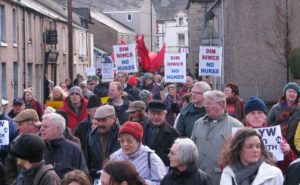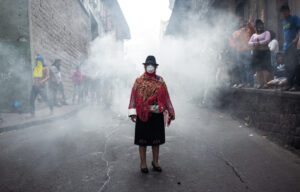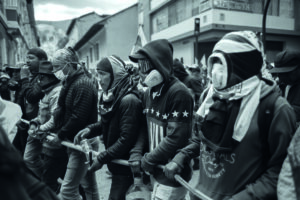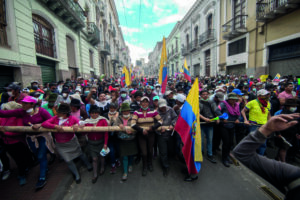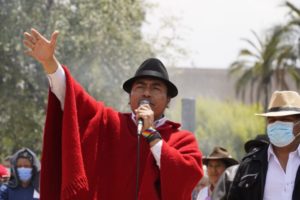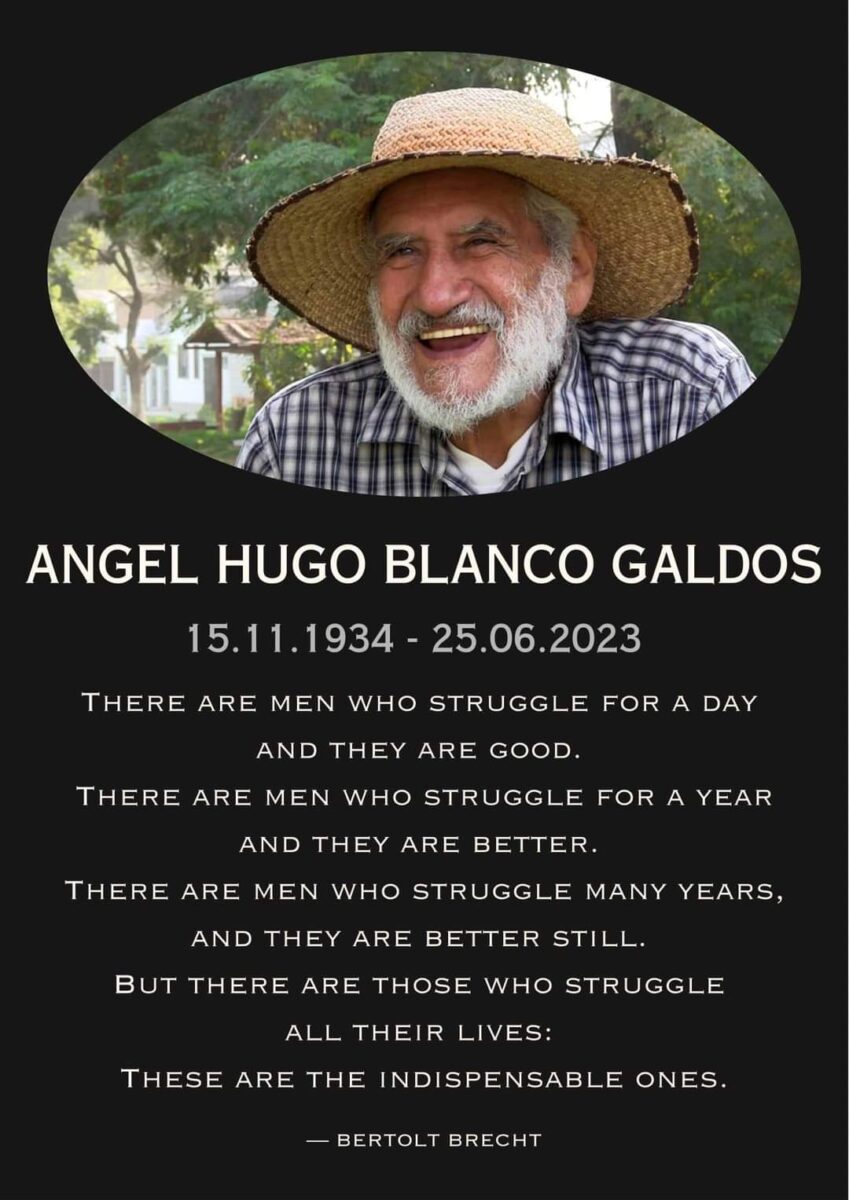Hard Right Fails To Make Breakthrough in Spanish State Election
Dave Kellaway writes for Anti*Capitalist Resistance on the general election in the Spanish state.
On Spanish TV on Sunday night, you had the rather bizarre spectacle of both major parties claiming victory.
The conservative People’s Party (PP) did become the largest single party but was 40 seats shy of a governing majority on its own. It is 7 seats short of a working coalition if it allied with the neo-fascist Vox (Voice). It had already done so in a number of regional parliaments after its clear victory in the May local and regional elections. Its leader, Feijoo, is proclaiming his right to try to form a government as the largest single party and denouncing attempts to stop him as blocking democracy. But he does not have the numbers and in politics that is what counts. It is unlikely that he can put together a coalition with Vox, which has called for the banning of nationalist parties, while at the same time bringing on board pro-independence parties in the Basque country.
Spanish State General Election Results, July 23, 2023
| Party | % vote | seats | 2019 % | 2019 seats |
| PP (conservative) | 33.1 | 136 | 20.8 | 89 |
| PSOE (social liberal) | 31,7 | 122 | 28.0 | 120 |
| Vox (post/neo fascist) | 12.4 | 33 | 15.1 | 52 |
| Sumar (radical left coalition includes Unido Podemos, Compromis, Mas Pais etc) | 12.3 | 31 | 12.9 (only Unido Podemos) | 35 (=same parties as in Sumar now) |
| ERC (Catalan nationalist) | 1.9 | 7 | 3.6 | 13 |
| Junts((Catalan nationalist) | 1.6 | 7 | 2.1 | 8 |
| EH Bildu (Basque Nationalist left) | 1.4 | 6 | 1.1 | 5 |
| PNV (Basque Nationalist mainstream) | 1.2 | 5 | 1.6 | 6 |
You need 176 seats to form a government.
On the other side, Sanchez, the leader of the social liberal PSOE (Socialist Workers Party), was exultant in his post-election speech. His party had won a million more votes than in the last general election in 2019 and two more seats. Opinion polls had predicted a significantly larger (+3% more) gap between the PSOE and the PP. The PP had centred their campaign on burying Sanchismo, organising a cultural war on his party’s measures in favour of trans, gays, and women. The rise of Vox to its right has meant it has adopted some of its reactionary policies.
Sanchez had gambled by calling this early election; he could have waited until later in the year. A defeat could have meant a challenge to his leadership. Undoubtedly, the strident calls to block the Francoist revanchists of Vox helped mobilise a significant part of the PSOE base. He has indicated that he will look to re-establish his coalition government. Already, he benefits from the support of some Basque and Catalan nationalists. The PSOE really needs to get at least the abstention of the Junts Catalan nationalists. Despite losing a seat and seeing the PSC (PSOE in Catalonia) and Sumar do well in Catalonia, Junts could now have a kingmaker role. Their leader, Puigdemont, has been persecuted by the Spanish state for his role in organising the unauthorised independence referendum in 2017. He is in exile in Belgium. The leader of Junts has already said they will not provide their support to Sanchez without something in exchange.
Yolanda Diaz, the leader of Sumar (Come Together), the new radical left coalition set up by her without the initial support of her Unidos Podemos leadership comrades, was also happy with the results. Sumar had just failed in its bid to beat Vox into third place and won fewer votes and seats than these components achieved in 2019, but it was a solid result that gives the formation some leverage in forming future coalitions with the PSOE. Yolanda claimed credit for helping to push back the neo-fascists, and certainly her campaign did mobilise around that issue.
Sumar, nevertheless, is far from the same political current that Podemos was at its height following the explosion of the 15M Indignados (angry ones) movement in 2011. Then there was a link between the new political current and a new, vibrant movement in the communities. Podemos wanted to replace the PSOE, not become its left satellite and coalition partner. In the 2016 general election, it was a point or so behind the PSOE at 21%. It argued then for a ‘rupture’ with the post-Franco regime established in 1978. Podemos was sympathetic to a radical new deal for the nations within the Spanish state and was anti-monarchy. Yolanda Diaz created Sumar as a further moderate iteration of a Podemos that had already moved right by becoming a coalition partner and taking ministerial posts. It represents the integration of the left of the PSOE into the institutions. Mobilising against Vox was important, but the anti-fascist campaign also helped to drown out any critical balance sheet of the real character of the PSOE/Sumar coalition. Some commentators on the left in Britain have tended to leave out this analysis.
During this election, Sumar put forward some more radical proposals than Sanchez, such as a large ‘inheritance’ grant of 20,000 euros for each 18-year-old. Such a measure looks positive, but it places redistribution within an individualist framework that does not particularly challenge capitalist society. The money does not alter in any way how resources are produced and distributed, unlike measures that take industries or utilities into common ownership. The left would not necessarily oppose such a measure; it involves some redistribution, clearly, but like universal basic income, it is a measure that the bosses can live with, and it even stimulates capitalist consumption.
Pushing back the neo-fascist Vox (which lost 3% of its votes but nearly half its seats) was a positive outcome of this election. It demonstrates that advancing fascism is combatable and that the hard right’s takeover of Europe is not an inevitable process. Unlike Starmer, Sanchez vigorously defended his progressive legislation against the PP/Vox cultural wars, demonstrating that you do not have to give ground on these issues. For example, in its Valencian stronghold, Naquera, where it had banned the LBGTQ+ flags, it lost the majority it had won in the local elections.
However, Vox will continue to govern in coalition in a number of regions, and its base has been consolidated. The impact its reactionary policies have had on a resurgent PP is another way to measure its political success. The latter, despite failing to get a majority, is now the largest party and has mopped up practically all the electoral support that the neo-liberal centrist party, Cuidadanos, formerly enjoyed.
Today, Sanchez is looking to knit together a new coalition. One problem is that all the small nationalist parties (See: *Note) that facilitated his previous investiture have lost seats except EH Bildu, the more left wing of the Basque parties. He really needs Puigdemont’s Junts to come onside, but Sanchez is wary of conceding too much to a leader that he has done nothing to free from exile in Belgium. Junts are demanding an amnesty for Catalan political prisoners and a referendum. It is not in a rush to deal with Sanchez, and they say they are unperturbed by a stalemate situation (El Diario, July 25). Already, there have been more Spanish general elections in recent times than elsewhere in Europe, and we could be heading for another one in a few months if no agreement is made.
The PP is desperately claiming some legitimate right to form a government as the largest party. After making a whole campaign around smashing Sanchismo, it is now asking the PSOE to allow it to govern. Apart from Vox, it is seeking the support of the moderate Basque PNV party, the Canary Coalition, and the UPN, a conservative party in Navarra. Sources suggest the numbers do not add up since the PNV has already said no. There may be some recriminations in the PP ranks over whether the alliance with Vox in regional governments had a negative effect on the general election.
The likely scenario is a new Sanchez-led coalition, which will be weaker given the surge in PP support, or new elections. Sanchez stated today that he is confident of rebuilding his coalition and that there will be no new elections. Feijoo’s PP and Vox will focus on Sanchez’s greater dependence on nationalist parties in order to mobilise conservative popular opposition to any new coalition. Despite Sanchez’s reassurances, there could be greater political instability.
This election has confirmed a return to more of a two-party system, with the PP and PSOE taking 65% of the vote. It had fallen below 50% at one stage with the emergence of Podemos and Cuidadanos. It will be interesting to see how Sumar develops. Will it be able to consolidate its disparate forces into a coherent political current? Will there be democratic internal structures—currently it is organised in a top-down way through apparatus-to-apparatus discussions mediated by the personality of Yolanda Diaz? Will there be pressure for some of its forces to be absorbed by the PSOE? Can Sumar be a party or movement where revolutionary socialists can organise, as was the case with Podemos for some time?
For people suffering from the cost of living crisis, poor or expensive housing, and deteriorating public services, the PSOE/Sumar government has not altered a great deal apart from some tweaks in the labour laws and progressive reforms on gender rights or on the historical truth about the Civil War. Abstention remains at 34%, which confirms the trend of recent years where many working people are alienated from the political system. The new situation, which is very polarised on the institutional level, is unlikely to change this. Building self-organisation outside of institutions to defend living standards and make social gains remains a key priority. The unions have been pretty much integrated into the government’s reformism without reforms. Recapturing the dynamic of the Indignados movement and the political radicalism of the early Podemos current is more important than ever.
26 July 2023
Republished from Anti*Capitalist Resistance: https://anticapitalistresistance.org/hard-right-fails-to-make-breakthrough-in-spanish-election/
*Note: The Catalan left wing anticapitalist group Popular Unity Candidacy (Catalan: Candidatura d’Unitat Popular, CUP) lost votes and its two seats in the Cortes, while the Republican Left of Catalonia (Catalan: Esquerra Republicana de Catalunya, ERC), aligned with the SNP, lost 6 seats and fell to 7 seats, its lowest number of seats since 2011. The gainer in Catalonia was the PSC, the name the PSOE adopts in Catalonia. However, the left wing Galician Nationalist Bloc (Galician: Bloque Nacionalista Galego, BNG) increased its vote share and held on to its single seat and, as the article explains, the more left wing of the Basque independentist parties EH Bildu (Euskal Herria Bildu – English: Basque Country Gather or Basque Country Unite) gained 1 seat. [Note from ecosocialist.scot editors]

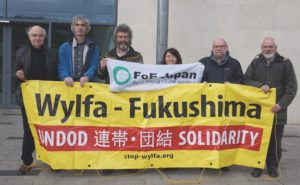 Councillor Sue Lent from Cardiff, Chair of the NFLA Welsh Forum added: “Nuclear projects are notorious the world over for being delivered very late and way over budget. Bechtel and Westinghouse have been involved in the development of two new reactors at Vogtle in Georgia. Construction there started in 2009, yet only this year will both reactors come on stream, and the project is being delivered at a cost approaching US$30 billion (£23 billion), over double the original budget.
Councillor Sue Lent from Cardiff, Chair of the NFLA Welsh Forum added: “Nuclear projects are notorious the world over for being delivered very late and way over budget. Bechtel and Westinghouse have been involved in the development of two new reactors at Vogtle in Georgia. Construction there started in 2009, yet only this year will both reactors come on stream, and the project is being delivered at a cost approaching US$30 billion (£23 billion), over double the original budget.